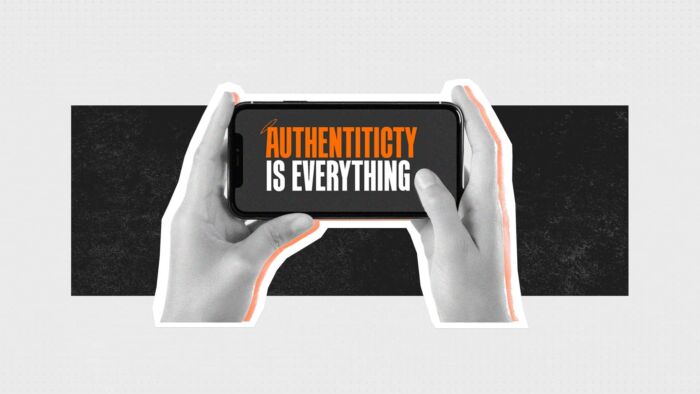Amidst the rising popularity of the ‘de-influencing’ trend, where content creators speak out against the products and brands to avoid, it’s clear that authenticity is a requirement rather than a compliment.
Why is authenticity in influencer marketing so important in today’s influencer space? And how can we ensure that (as brands and agencies) we’re doing our best to ensure our activities cater to the changing habits of online consumers, namely Gen Z.
Contents
What does authenticity mean in influencer marketing?
Why is authenticity in influencer marketing so important?
6 ways influencers can achieve authenticity
How to ensure your brand’s influencer marketing is authentic

What does authenticity mean in influencer marketing?
Marketing must be authentic because consumers today are increasingly savvy and can quickly detect “fake” marketing messages. If a brand is perceived as insincere or dishonest, it can damage their reputation and make it difficult for them to build trust and loyalty with their target audience.
Authenticity in marketing is vital. It helps to establish a genuine connection with consumers, builds trust, and creates a sense of loyalty. Consumers want to know that the brands they support are true to their values and are not simply trying to make a profit by using deceptive tactics.
Why is authenticity in influencer marketing so important?
If influencer marketing is not authentic, it can damage the reputation of both the influencer and the brand they are promoting. Inauthentic influencer marketing can take many forms, such as promoting products or services that the influencer does not actually use or believe in, using fake followers or engagement to inflate their perceived influence, or failing to disclose sponsored content properly.
When influencer marketing is not authentic, it can erode the trust that consumers have in both the influencer and the brand. Consumers today are increasingly skeptical of traditional advertising and are looking for genuine, honest recommendations from people they trust. If an influencer is perceived as being insincere or dishonest in their recommendations, it can lead to a loss of credibility and influence among their audience.
Consumers need influencer marketing to be authentic because they want to trust the recommendations and opinions of the influencers they follow. Influencers have become a popular source of information and inspiration for many consumers, particularly younger demographics, and they are seen as more relatable and trustworthy than traditional advertising.
Consumers today are increasingly savvy and can quickly detect inauthenticity in marketing messages. If they perceive an influencer as being insincere or dishonest in their recommendations, it can lead to a loss of credibility and influence among their audience.
If consumers feel like they have been deceived or manipulated by inauthentic influencer marketing, they may develop negative perceptions of the brand and be less likely to purchase their products or services in the future. This can ultimately result in lost sales and revenue for the brand.

6 ways influencers can achieve authenticity
Authenticity is key amongst today’s influencer culture. Here are six ways in which influencers can promote and maintain authenticity:
- Being genuine and relatable
An authentic influencer is someone who is relatable to their followers and is perceived as genuine in their communication. They share their experiences, stories, and opinions in a way that resonates with their audience.
- Consistency
Authentic influencers are consistent in their messaging and content across all channels. They do not promote products or services that are not aligned with their values or interests.
- Gaining the audience’s trust
An authentic influencer is someone who is trustworthy and honest with their followers. They disclose sponsored content properly and do not promote products or services that they do not actually use or believe in.
- Engaging your followers
Authentic influencers are engaging and responsive to their followers. They build relationships with their audience by responding to comments, messages, and other forms of engagement.
- Showcasing a passion for your craft
An authentic influencer is passionate about their niche and is knowledgeable about the topics they cover. They are not just in it for the money, but truly care about the content they create and the community they have built.
- Transparency with your audience
Authentic influencers are transparent in their communication and interactions with their followers. They disclose when they have been compensated for a post or review and are upfront about any biases they may have. Just take Liver King for example. The popular figure claimed his enormous figure, which he built a following off of, was gained through an ancestral lifestyle, encouraging his followers to follow a raw meat diet and directing them toward his online store to purchase supplements. As it turned out, Liver King was actually using steroids, which resulted in backlash from his followers and the wider internet.
The 4 types of influencers
There are typically four types of influencers based on their follower count and level of influence in their respective niches:
Hero influencers
Hero influencers are the most well-known and have the largest followings, typically over one million followers. They have a broad reach and are often celebrities, athletes, or high-profile personalities. They can be effective in reaching a large audience but may not have as much influence on niche topics.
Macro influencers
Macro-influencers typically have followings in the range of 100,000 to one million followers. They have a more targeted audience and are often experts in their respective niches. They can be effective in promoting products or services to their niche audience and are often more accessible than hero influencers.
Micro influencers
Micro-influencers typically have followings in the range of 10,000 to 100,000 followers. They have a highly engaged audience and are often considered experts in their respective niches. They can be effective in promoting products or services to niche audiences and are often more affordable than macro or hero influencers.
Nano influencers
Nano influencers typically have followings of less than 10,000 followers. They have a highly targeted and engaged audience, often consisting of friends, family, or colleagues. They can be effective in promoting products or services to a small community and are often very affordable.

The ‘de-influencing’ movement
Over the past few months, social media users and influencers have become more transparent about their decision to avoid promoting viral products to prevent excessive consumption. However, instead of promoting the viral product, they are recommending alternative products that are cheaper or from the product’s competitors. Marketers observe that consumers are increasingly scrutinizing influencer content, and moving towards a more conscious lifestyle that prioritizes community, authenticity, and businesses with values, and reject the culture of mass consumerism and the pursuit of perfection.
the trend of de-influencing on TikTok has gained traction, with over 300 million videos tagged with #deinfluencing on the platform. Gen Z is now shifting their purchasing habits towards intentional and sustainable consumption. In response to this shift, marketers are prioritizing aligning influencer communications with their values.
We’re at a time when Gen Z consumers are becoming more frustrated with the sheer volume and frenzy around influencer pitched products that they ultimately don’t need. The time for authentic content, promotions and perceptions is critical.
With that in mind, let’s look at how your brand can practice more authentic influencer marketing.
How to ensure your brand’s influencer marketing is authentic
Brands can ensure that their influencer marketing is authentic by taking the following steps:
- Carefully choosing influencers: Brands should carefully select influencers who are a good fit for their brand and have a genuine interest in the product or service being promoted. The influencer’s values, personality, and content should align with the brand’s values and messaging.
- Setting clear guidelines: Brands should establish clear guidelines for the influencer regarding the content that is to be created, the messaging that should be used, and any legal requirements, such as disclosure of sponsored content. These guidelines should be communicated in a clear and concise manner.
- Encouraging creative freedom: Brands should give influencers creative freedom to develop content that resonates with their audience and aligns with the brand’s messaging. However, they should also ensure that the content meets the established guidelines.
- Disclosure of sponsored content: Influencers should disclose sponsored content clearly and prominently, in compliance with applicable laws and regulations. This includes using hashtags such as #ad or #sponsored to indicate that a post is sponsored.
- Monitor influencer activity: Brands should monitor influencer activity to ensure that their content meets the established guidelines and is authentic. They should also be prepared to address any issues that may arise, such as negative feedback or lack of engagement.
- Partnering with an influencer agency: An influencer agency can ensure authentic influencer marketing by providing expertise, access to a larger pool of influencers, quality control, efficiency, and performance tracking and reporting. Influencer agencies have experience and expertise in identifying and working with influencers, and they can save brands time and resources by handling administrative tasks such as contract negotiation, content approval, and payment processing. They also have relationships with influencers and can negotiate more effectively on behalf of the brand. Influencer agencies can provide quality control by vetting influencers, ensuring that they meet the brand’s standards and expectations, and providing guidance and feedback to influencers. Finally, influencer agencies can track the performance of influencer campaigns and provide detailed reports to assess the effectiveness of the campaign.
Conclusion
At a time when influencers and online audiences are calling out brands for oversaturation and insincere messaging, authenticity in influencer marketing is more important than ever.
Authentic marketing establishes a genuine connection with consumers, builds trust and creates loyalty. Inauthentic influencer marketing can damage the reputation of both the influencer and the brand they promote. Consumers require influencers to be authentic, trustworthy, honest, and transparent in their communication and interactions with their followers. There are many ways for Influencers to achieve authenticity, some being genuine and relatable, consistent, gaining the audience’s trust, others by engaging with followers, showcasing passion for their craft, and being transparent.
To learn more about influencer marketing, and how to authentically carry out campaigns across the available platforms, check out some of our best-in-class work.





